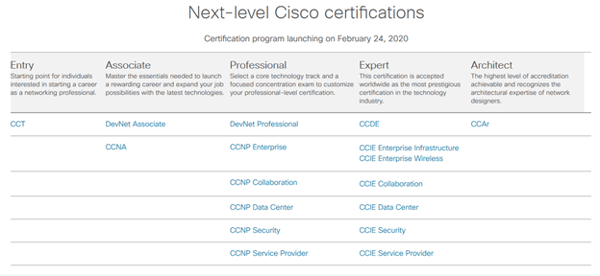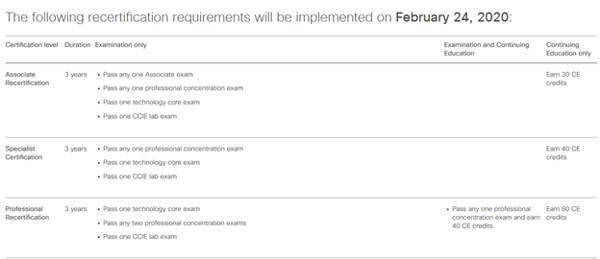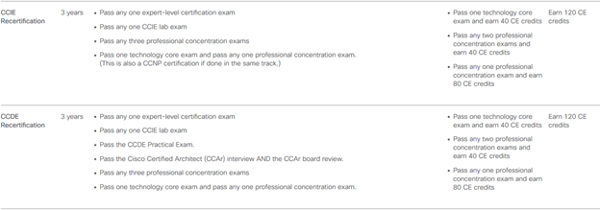If you haven’t heard, Cisco is redesigning their certification programs. Starting February 24, 2020 this new design will be in place. Let’s take a look at the upcoming changes.

Entry
First thing to note is that the CCENT will be no more. This is one of many certifications that will be retired. The CCT will remain and it will be available, and you will still be able to get a CCT certification for both Data Center and routing and switching technologies. Cisco Certified Technicians (CCT) have the skills to diagnose, restore, repair, and replace critical Cisco networking and system devices at customer sites. If you’re working on the CCENT right now don’t get discouraged, you’re just going to have to push a little harder to get the CCNA before February, so you’ll have something to show for all your hard work.
Associate
Big changes for the associate level certifications, they’re all being retired! With the new design there will be only one certification that covers a broad range of fundamentals for IT careers, with one exam. The CCNA exam will also include security and automation and programmability. If you have started working toward any current CCNA or CCDA certification, keep going. You have until February 23, 2020 to complete your current CCNA/CCDA. If you complete any current CCNA/CCDA certification before February 24, you’ll receive the new CCNA certification and a training badge in the corresponding technology area. There is also a new Associate level certification being introduced for all my developer friends out there, the DevNet Associate! Achieving the DevNet Associate certification proves your skills in developing and maintaining applications built on Cisco platforms. To earn DevNet Associate certification, you pass one exam that covers the fundamentals of software development and design for Cisco platforms. This new exam will cover Understanding APIs, application development and security, and infrastructure and automation.
Professional
At the professional level there are a few key changes. The biggest one in my opinion being that you do not need a CCNA in order to go for your CCNP. There are still multiple CCNP tracks for you to choose from including 2 new ones DevNet Professional and CCNP Enterprise. CCNP Enterprise is pretty much the CCNP R&S and it will focus on dual-stack (IPv4 and IPv6) architecture, virtualization, infrastructure, network assurance, security, and automation. To attain any CCNP you will have to pass two exams, a core exam for your technology and a concentration. Depending on what technology you’re studying for there are some pretty cool concentrations that allow you to tailor your learning to your interests. And you don’t have to stop at just one concentration. With the new design you will get recognition for all your hard work through a badge system. So, the more concentrations you learn the more badges you get. Below are a few of the different concentrations available for the different technologies.
Collaboration:

Enterprise:

Security:

Data Center:

If you have started working toward a current CCNP certification, keep going. In the new program, you’ll receive credit for work you’ve completed in the current certification. If you pass any exams in the current certification before February 24, you’ll receive badging for corresponding new exams and credit toward the new CCNP Certification. If you complete the current certification before February 24, you’ll receive the new CCNP certification and badging for corresponding technologies.
Expert
To receive your CCIE you must pass 2 exams one on the core technologies of you chosen track and a hands-on lab. The cool part about this is that the same core exam that will get you your CCNP qualifies for your CCIE as well. So, if you already have your CCNP all you need to do is pass the lab. One thing to note is, just like the CCNP you do not have to have any prior certification to go for your CCIE just pass these 2 exams. If you have started working toward the current CCIE certification, keep going. In the new program, you’ll receive credit for work you’ve completed in the current certification. If you pass the current CCIE written exam before February 24, you will be eligible to take the new CCIE exam after February 24. After February 24, the CCIE written will be replaced with core exam for your specific track. After you pass core exam, you will earn the Cisco Certified Specialist Core certification in your track. If you complete the entire CCIE certification before February 24, then as of February 24, you’ll maintain your CCIE certification as per the new re-certification guidelines, and you will also receive the Cisco Certified Specialist Core certification.
Re-certification
On February 24, 2020, the Cisco re-certification policy will provide a flexible alternative option to meet re-certification requirements. This new approach encourages candidates to diversify their skill sets and provides multiple paths for maintaining their certifications. All certifications will have a three-year re-certification deadline. The Continuing Education program will extend to the CCNA, Specialist, CCNP, CCIE certifications. The continuing education point cap for Cisco Live activities and content-authoring, such as writing exam items, has been removed. You can still re-certify by passing re-certification exams, but individuals can now also re-certify by completing continuing education activities and earning points within those three years. As always, you can re-certify by advancing to the next level of certifications as well. Certification must be met prior to the certification expiration date. Individuals with expired certification must repeat the entire certification exam process in order to regain their certification status.



If you are interested in getting a specialist certification such as UCCE specialist, the certification process seems to be the same. I’m excited to see how well this new system works. Will the CCNP be harder to get since the core exam is the same for both CCNP and CCIE? Without any formal requirements to take these exams will it be easier to get the professional and expert level certifications and skip the CCNA all together? What will happen in network automation with the new DevNet certification tack? Change brings about so many questions, but only time will tell. Good Luck on your journey to certification my friends and remember February 23rd, 2020 is the deadline.
Written By: Terrance B Ellis, UC Engineer
Here at LookingPoint our engineers have many of Cisco's certifications and are ready to help you with any of your technology questions, concerns or comments. Feel free to contact us here so we can help you with any of your IT needs.




